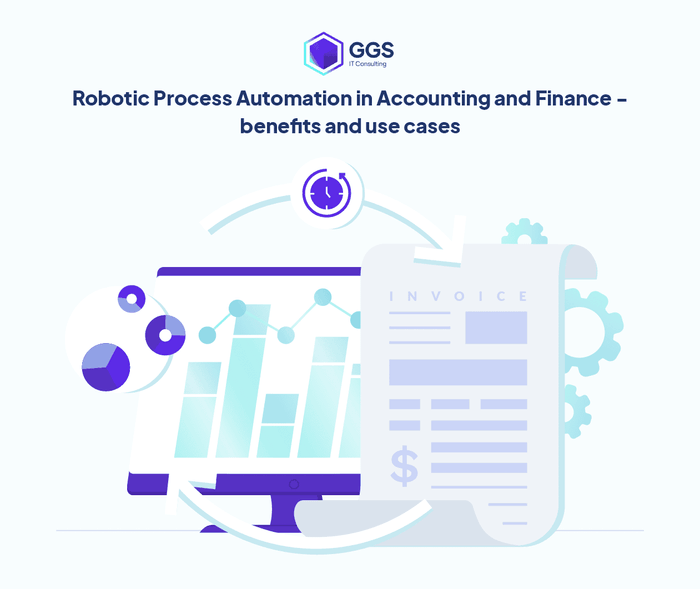
Robotic Process Automation in Accounting and Finance - benefits and use cases

Are you frustrated by tedious accounting processes? Use RPA for accounting automation. Learn about RPA use cases in accounting, implementation, and benefits for companies. Read more.
Technology is transforming business processes at a rapid pace, including accounting. In today’s hypercompetitive market, automation is crucial for success. Robotic Process Automation (RPA) is one of the most disruptive innovations in this field. RPA is no longer a buzzword but a must-have for enterprise-scale companies. According to Deloitte's RPA survey, 53% of organizations had adopted RPA by 2018. And almost all large companies will have started their RPA journey by 2024. Despite the widespread adoption of RPA, less than one-third of adopters utilize the technology for accounting and financial reporting. Innovative managers are leveraging RPA to automate accounting processes and optimize business operations. But what is RPA? And how do you use it for accounting automation?
What is Robotic Process Automation in Accounting?
RPA is a software technology that augments people with process automation. Today’s accountants use computer-dependent tools and processes with several manual steps and keystrokes. RPA can transform accounting workflow by combining disparate actions into a smooth automated process. Here is simplified robotic process automation:
- First, the RPA bot captures users’ on-screen actions like clicks and entries when performing accounting tasks.
- Second, the application generates a script based on users’ on-screen movements.
- Third, the RPA bot uses generated scripts to automate repetitive, rule-based accounting tasks.
RPA bots mimic human actions in carrying out a task within a process. These software applications can execute repetitive tasks quickly, accurately, and consistently. For accountants, RPA provides a unique opportunity to optimize their accounting processes.
Why do Enterprises need Accounting Automation with RPA?
As a manager or C-Suite, your organization relies on you to find solutions to new and emerging challenges. Adversity catalyzes innovation and drives digitization. According to Gartner, 90% of enterprise-scale companies will have adopted RPA by 2022. Accounting automation using RPA can help your company adapt to the new normal and thrive in these trying times. Here are five reasons why your organization needs RPA for accounting automation:

Labour Shortages
In the post-pandemic era, labour shortages threaten labour-intensive sectors such as transportation and retail. As a CEO or manager, adopt efficient strategies to preserve scarce human resources in your company. Automating processes can help reduce your organization’s overdependence on human labour. You can automate accounting processes using RPA to lighten your team’s workload. Then, redirect saved work hours to other tasks or departments to counter labour shortages.
Service Delivery
Today's consumers have easy access to numerous options. To stand out from the crowd, deliver excellent customer service and the best experience consistently. The last you need is to lose a supplier or customer due to delays in invoice processing. You can adopt RPA in accounting to automate time-consuming tasks and improve service delivery and customer experience.
Regulatory Compliance
With the widespread adoption of cloud-based solutions, the business environment has expanded beyond the premises. It is increasingly challenging for companies to enforce global and industry standards for regulatory compliance. Using RPA can help you ensure accurate and consistent implementation of accounting best practices and rules organization-wide. For example, use RPA robots to create audit trails for accounting tasks with sensitive data. These trails visualize the entire process and enable historical auditability, reducing the risk of non-compliance.
Data Governance
Accounting tasks like invoice processing involve working with sensitive client information. Efficient data governance requires direct supervision to mitigate the risk of data leaks and breaches. Can you supervise accounting teams working remotely? No, you can’t. Robotic process automation can help your company overcome this challenge. For example, emails contain sensitive data and clients’ personally identifiable information (PPI). So, you can use RPA to extract relevant data from emails for invoice processing. Automating this step with RPA reduces exposure and the risk of data leaks by insidious internal actors.
Digital Transformation
Disruptive technologies like AI and RPA have leveled the playing field, empowering start-ups at the expense of global giants. Enterprise-scale companies can fend off stiff competition from start-ups by investing in digital transformation. Process automation is crucial for digital transformation and long-term success in today’s tech-driven marketplace. Using RPA, you can digitize invoices, automate accounting processes, and leverage AI to streamline workflow. You can also measure and optimize accounting process automation for continual improvement. Adopting RPA is a necessary step towards digital transformation.
What are the Use Cases of RPA in Accounting?
Most enterprise-scale companies have to process hundreds or thousands of transactional records per month. Accounting teams have to search for documents across information systems, scan them, review digital copies, extract data, and complete data entry. RPA can help streamline this process and eliminate human errors. Here are the top RPA use cases in accounting.

1. Invoice Processing for Accounts Payable
Invoice processing requires timely execution, accuracy, and consistency. But achieving this level of perfection is easier said than done without automation. For starters, manual invoice processing can lead to operational lags in accounts payable. You can use RPA to automate invoice processing, including receiving, verifying, and paying invoices. RPA with optical character recognition (OCR) extracts data from different sources, matches purchase orders with invoices, and flags mismatched documents. Then, they’ll send cleared invoices to assigned team members for approval and set up reminders. To boost Days Payable Outstanding (DPO), automate accounts payable processes with RPA. Your bot can streamline vendor verification, purchase order entry, payment reconciliation, and expense compliance audit.
2. Accounts Receivable
This accounting process is prone to errors and relies on internal documents, ideal for automation. It requires accuracy and timely execution to boost Days Sales Outstanding (DSO). But achieving this is challenging due to the human element on the payee's and the recipient's side. You can use RPA to automate Accounts Receivable processes, including customer data setup and management, data extraction, sales quotation, and invoice generation and distribution. RPA solutions with robust features can improve cash flow and eliminate cash gaps. RPA collects data from different sources and executes data entry automatically. So, accountants won't need multiple information systems.
3. Expense Reporting
Companies accumulate expenses from different business activities. Expense reporting is crucial for efficient bookkeeping and finance management. However, this process is tedious and costly when performed manually. According to statistics, producing one expense report costs about $27. Automation can reduce this cost to $5/report. You can automate expense reporting using RPA. Robust RPA bots can aggregate data into expense reports, attach receipts to corresponding entries, verify existing expense logs, and flag policy violations or data discrepancies. Automating this process using RPA can reduce errors, improve employee experience, and enhance adherence to company policies and legislation.
4. Payroll Management
Managing employee payroll involves several time-consuming tasks, such as data extraction and entry, timesheet validation, scheduling payments, and calculating pay-outs and deductibles. Your accounting team will also verify employee information from different systems, including sick days and expenses. To avoid payment delays and inaccuracies, use RPA to automate payroll management. Robust RPA bots can extract data from different sources and calculate deductions and bonuses with 100% accuracy, complying with tax requirements.
5. Financial Reporting, Planning, and Forecasting
Successful companies monitor their financial performance by tracking and reporting profits and losses accurately and consistently. As a professional in accounting, you understand the challenges of updating P&L reports manually. You can use RPA to automate this time-consuming process and enable accurate financial reporting in real-time. RPA bots can create balance sheets and income statements and streamline variance analysis and financial-close processes. They can also improve financial planning and forecasting by leveraging historical data and relevant information in documents. Using RPA to automate this business process can enhance transparency and accuracy.
6. Intercompany Reconciliations (ICR)
You can use RPA to automate ICR, providing accurate financial statements by balancing accounts. This process involves time-consuming data entry, extraction, and cross-checking. RPA bots can gather transactional data, approve matching docs, and flag discrepancies. They can streamline data retrieval, cross-check statements, email customers, and create journal entries.
7. Tax Compliance
Enterprise-scale companies that operate globally or nationwide comply with several state and federal tax regulations. To reduce the risk of non-compliance, use RPA robots with your tax compliance software. RPA bots can gather data for tax liability, create a tax basis, update tax return workbooks, and prepare and submit tax reports to authorities. Automating these tasks can save you time and legal issues down the road.
8. Inventory Management and Accounting
In today’s trying times, supply chain issues threaten retail companies globally. Efficient inventory management is crucial now more than ever. Inventory accounting is all about capturing stock levels in financial records, from profit & loss reports to balance sheets. This business process requires accuracy, making it ideal for automation. RPA bots can streamline inventory management by monitoring, forecasting, and alerting inventory levels and placing stock orders. You can also RPA solutions to automate inventory accounting processes, including data extraction and entering data in financial records. With RPA, e-commerce and retail stores can improve lead times, reduce stock-outs, and optimize storage costs.
How can RPA Accounting benefit Enterprise-scale Companies?
Most people associate automation with 24/7 reliability and availability, applicable for RPA. RPA bots for accounting automation don't need sick-offs. They provide high-quality service and deliver 100% accuracy and consistency. Here are some of the benefits of using RPA for accounting automation in enterprise-scale companies:

Cut Costs
According to the Institute for RPA, RPA solutions can help companies save 25-40% in labour costs. Time is money. RPA robots handle repetitive tasks faster than humans, saving scarce resources. Automate accounting processes with RPA to reduce labour costs.
Increase Productivity
Think of the amount of time wasted collecting data and filling invoices. These time-consuming tasks create bottlenecks and reduce your accountants’ output. You can adopt RPA for accounting automation to eliminate manual work from your workflow. RPA bots can complete tasks 20 times faster than humans, increasing productivity organization-wide.
Reduce Errors
In large companies, accounting processes involve numerous steps and several departments. Minor human errors in each stage or department can accumulate, leading to significant losses. Using RPA, enterprise-scale companies can automate manual and error-prone accounting procedures to eliminate human errors from the equation.
Time Efficiency
According to Gartner, RPA can save finance departments and accounting teams from 25,000 hours of avoidable rework caused by human errors. Adopting RPA for accounting automation is an effective way to reduce time wastage and boost operational efficiency. With RPA, your accountants will spend less time on mundane tasks. You can redirect saved hours to revenue-generating activities, increasing your company’s competitive advantage.
Ensure Compliance
With the expanding business environment, ensuring regulatory compliance is increasingly challenging. Innovative RPA solutions reduce errors and create trails for each task, improving historical documentation and auditability. Adopting RPA for accounting automation can help enterprise-scale companies ensure higher compliance with internal and external financial regulations.
Improve Customer Service
A single error in reconciliation can delay invoice processing and undermine customer experience. To improve customer service, automate manual and repetitive tasks in your accounting workflow using RPA. Robust RPA systems can scale to meet the demand, enhance accuracy, and reduce delays. RPA bots deliver high-quality customer service and the best customer experience.
Centralized Data
Think of RPA robots as ERP-agnostic connective tissues between different systems. They interact with multiple data sources and consolidate accurate information in a single location. With RPA, you won’t have to visit several systems or departments to find mission-critical financial data.
RPA benefits go beyond process automation to include psychological gains. Working on repetitive tasks for prolonged periods is demoralizing. Using RPA, you can automate mundane accounting tasks and boost your teams' morale. This technology also allows for continuous improvement. As a manager and departmental head, leverage your accountants’ knowledge and skills to enhance the capabilities of your RPA bots. You can create a Centre of Excellence (CoE) to acquire and transfer accounting best practices from skilled accountants into your RPA solution. This strategy can help your organization optimize accounting processes for continuous improvement.
Conclusion
Robotic Process Automation is transforming different departments in enterprise-scale companies. As a C-Suite or manager, you can adopt RPA to automate invoice processing, expense reporting, payroll management, and financial forecasting. Accounting automation using RPA offers several benefits, including reduced costs and losses and improved productivity and regulatory compliance. To get the most out of your solution, adhere to RPA implementation best practices.
If you wonder how to start or improve the implementation of automation and digitization of processes and document flow in your company, contact us for your 30 minutes free consultation.
After completing the form, we will arrange a call at a time convenient for you. During the call, our consultant will suggest how to approach the Robotic Process Automation initiative in your Company. Thanks to this, you will assess which technologies will bring you the greatest benefits in the area of automation and standardization of processes.
